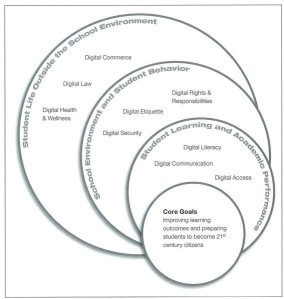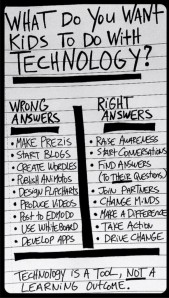Teachers teach citizenship in the school and classroom everyday. Overlying themes of honesty, compassion, respect, responsibility, and courage are engrained in the way we model and set up our schools and classrooms. It used to be enough to teach students how to interact appropriately face to face but not anymore. As society advances and we focus more on our digital world it is also necessary for us to teach and model the citizenship of our new digital world. I do try to present a positive online identity, so much so that I sometimes think I look better online than in real life. For instance no make-up, baggy sweatpants at the grocery store versus strategically chosen photos for my social network profiles haha! Really on a more serious note, I recently completed a project for my masters program around the idea of digital citizenship. It is an important topic for me as a middle years teacher I see so much misuse of technology and absolutely no regard for digital identity and footprint. In the current course that I am taking we recently had an amazing guest speaker, Bonnie Stewart, who discussed with us the idea of networked identity. Throughout her presentation my mind kept coming back to the idea of digital citizenship and our responsibility to guide students through their digital world just as we do their face to face world.
Where do we start with digital citizenship in our school and classrooms?
I think first we need to understand the concept of digital citizenship. What does it mean? What does it look like?
“Digital Citizenship is the norms of appropriate, responsible technology use.” This is a definition from Mike Ribble author of Digital Citizenship in Schools. His ideas are based around the nine elements of digital citizenship and their organization into three categories. For sure some good information for organizing, understanding, and teaching of the concept of digital citizenship.
“Students understand human, cultural, and societal issues related to technology and practice legal and ethical behavior.” This second definition comes from the International Society for Technology in Education or ISTE. My division has been using ISTE as a sort of guide for teachers to help them with the teaching and use of technology in their classrooms. It includes student and teacher standards. I think the big goal is to try to get educators to move in the direction of teaching about technology use and citizenship not specific tools of technology. Digital citizenship is about what we want students to learn not about what we want them to do. The graphic below is a description of what I mean.
More resources to check out!
Here are a few I came across when researching for my project.
- 5 Reasons You Should be Teaching Digital Citizenship Paul Barnell (2014)
- The Ministry of Education in the province of Saskatchewan has recently begun the process of purchasing license agreements for Media Smarts. “MediaSmarts is a Canadian not-for-profit centre for digital and media literacy. Our vision is to ensure that young people have the critical thinking skills to engage with media as active and informed digital citizens.” (Media Smarts 2014)
- Sasktel’s “I am Stronger” campaign focuses on anti-bullying, community, and networking of young people in Saskatchewan. The Ministry of Education in the province of Saskatchewan has set a deal with Sasktel’s “I am Stronger” campaign to set up space to house digital citizenship resources for educators, parents, and students.
- The DCMOOC in Saskatchewan was a massive open online course about digital citizenship facilitated by Dr. Alec Couros and supported by the Government of Saskatchewan. The entire focus is on digital citizenship. Although the course is currently over there is still an abundance of resources for educators and parents on the site in the form of recorded Blackboard Collaborate sessions, as well as on google+ community and Twitter (#DCMOOC, #dcmchat).
- Common Sense Media is a not-for-profit organization “dedicated to improving the lives of kids and families by providing the trustworthy information, education, and independent voice they need to thrive in a world of media and technology.” (Common Sense Media 2014) Their digital citizenship section includes tool kits, printable posters, and units available at no cost for educators and parents.
I also recently watched this Ted Talk Video then saw it on my fellow classmate Kelly Christopherson’s blog and wanted to share it as a close to my post.
Your Life Online – Permanent as Tattoo – Juan Enriquez
Do you have any great resources to add to my list for learning about and teaching digital citizenship? I would love to check them out so please feel free to add them in the comments section.

